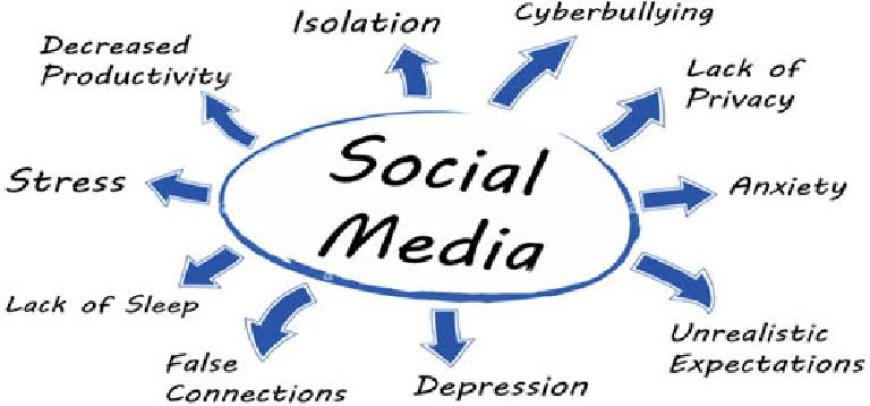SOCIAL MEDIA: A FRIEND OR FOE TO YOUR MENTAL HEALTH?
Social media offers benefits like reducing loneliness and providing information, but it also poses challenges such as insecurity, FOMO, and cyberbullying. To maintain a healthy balance: * Limit screen time and notifications * Prioritize specific goals when using social media * Consider therapy to manage negative thoughts and improve self-esteem As social media evolves, stay informed about its impact on mental health and make informed choices to protect your well-being.

SOCIAL MEDIA: A FRIEND OR FOE TO YOUR MENTAL HEALTH?????????
Social media platforms such as Instagram, Facebook, WhatsApp, Twitter, Snapchat, TikTok, and the rest have grown to become an integral part of our everyday lives since we use them to stay connected to friends and family, share our thoughts and experiences, and also get news and some of that much-needed entertainment.
In the midst of it all have you ever stopped to think about the impact all of these have to do on our mental health? Let's get into it….
THE GOOD.
1. Reduce loneliness and isolation: Social media allows us to connect with people who share our views and interests even though we don't live near them. Take Omegle for example. Omegle is a platform where you can engage in random 1v1 video chats with strangers worldwide. It pairs users randomly, creating opportunities for spontaneous and diverse conversations in live video chat settings.
2. Grow your Audience: Social media provides the opportunity to build a loyal following of customers and clients as well as fans of your brand. Consider Rodney, a renowned Nigerian TikToker who boasts an impressive following of 7 million. This sizable audience has catapulted him to prominence, attracting the attention of brands eager to collaborate with him for promotional purposes.

3. Source of latest Information: Twitter, Facebook, YouTube, and other platforms have emerged as real-time news sources providing instant updates on happenings from around the world. This facilitates access to breaking news and helps people stay informed on current events as they unfold. These platforms also enable people to easily share news and views.
4. Business and Marketing Opportunity: Companies utilize social media for market research on consumer preferences and feedback. It provides a venue for increasing brand awareness through promotions and engagement with customers. Many brands also leverage social media platforms for lead generation, sales, and customer retention through dedicated business pages and community building.
5. Provides Entertainment: From accessing the latest music videos on YouTube, and watching mini-movies on Instagram reels, and Facebook videos to sharing viral jokes & memes – social media facilitates entertainment consumption. Channels like TikTok have gained popularity solely for entertainment via short videos & clips.
6. Promotes Skill Development: YouTube, Instagram, Facebook groups, and other video/image-sharing platforms enable users to learn new skills by accessing instructional videos, posts, and live streams on cooking, arts, design, academics, and more niche interests. The availability of specialized skill-building content empowers self-learning.
7. Supplement to Education:Students and academics actively use social networking platforms for collaboration, knowledge sharing, accessing the latest research and study resources as well as promoting scientific initiatives. Educators supplement classroom teaching with social media tools for increased student engagement.
THE BAD
Despite the myriad of advantages and gratifications it offers, social media can also cast a detrimental shadow on our mental well-being, affecting us in the following ways:
1. Inadequacy about your life or appearance: Even if you know that images you’re viewing on social media are manipulated, they can still make you feel insecure about how you look or what’s going on in your own life. Similarly, we’re all aware that other people tend to share just the highlights of their lives, rarely the low points that everyone experiences. But that doesn’t lessen those feelings of envy and dissatisfaction when you’re scrolling through a friend’s airbrushed photos of their tropical beach holiday or reading about their exciting new promotion at work.
2. Fear of missing out (FOMO) and social media addiction: While FOMO has been around far longer than social media, sites such as Facebook and Instagram seem to exacerbate feelings that others are having more fun or living better lives than you are. The idea that you’re missing out on certain things can impact your self-esteem, trigger anxiety, and fuel even greater social media use, much like an addiction. FOMO can compel you to pick up your phone every few minutes to check for updates, or compulsively respond to every alert—even if that means taking risks while you’re driving, missing out on sleep at night, or prioritizing social media interaction over real-world relationships.
3. Isolation: Key findings of the University of Pennsylvania show that high social media usage (SMU) is significantly associated with loneliness. People who spent more than two hours on social media per day were more likely to report feelings of loneliness and social isolation. This relationship was observed from across Facebook, Snapchat, and Instagram.
The study suggests that constant exposure to curated and idealized representations of others on social media can lead to:
Social comparison: Individuals may compare themselves unfavorably to others, leading to feelings of inadequacy and dissatisfaction.
Displacement of real-world interaction:Excessive SMU may replace meaningful offline relationships, leading to a decline in social support and connection.
Participants who reduced their SMU reported improvements in mood sleep and happiness. They also had increased social interaction and stronger relationships in real life.
4. Depression and anxiety: Human beings need face-to-face contact to be mentally healthy. Nothing reduces stress and boosts your mood faster or more effectively than eye-to-eye contact with someone who cares about you. The more you prioritize social media interaction over in-person relationships, the more you’re at risk for developing or exacerbating mood disorders such as anxiety and depression.
5. Cyberbullying: About 10 percent of teens report being bullied on social media and many other users are subjected to offensive comments. Social media platforms such as Twitter can be hotspots for spreading hurtful rumors, lies, and abuse that can leave lasting emotional scars.
6. Self-absorption: Sharing endless selfies and all your innermost thoughts on social media can create unhealthy self-centeredness and distance you from real-life connections.
The impact of social media on mental health is not always clear-cut. Some people may find that social media has a positive impact on their well-being, while others may find that it has a negative impact.
WHAT TO DO
If you’re spending an excessive amount of time on social media and feelings of sadness, dissatisfaction, frustration, or loneliness are impacting your life, it may be time to re-examine your online habits and find a healthier balance.
STEP 1: Reduce Time Online:
A 2018 University of Pennsylvania study found that reducing social media use to 30 minutes a day resulted in a significant reduction in levels of anxiety, depression, loneliness, sleep problems, and FOMO. But you don’t need to cut back on your social media use drastically to improve your mental health. The same study concluded that just being more mindful of your social media use can have beneficial results on your mood and focus.
While 30 minutes a day may not be a realistic target for many of us—let alone a full “social media detox”— we can still benefit from reducing the amount of time we spend on social media. For most of us, that means reducing how much we use our smartphones. The following tips can help:
Use an app to track how much time you spend on social media each day. Then set a goal for how much you want to reduce it.
Turn off your phone at certain times of the day, such as when you’re driving, in a meeting, at the gym, having dinner, spending time with offline friends, or playing with your kids. Don’t take your phone with you to the bathroom.
Don’t bring your phone or tablet to bed. Turn devices off and leave them in another room overnight to charge.
Disable social media notifications. It’s hard to resist the constant buzzing, beeping, and dinging of your phone alerting you to new messages. Turning off notifications can help you regain control of your time and focus.
Limit checks. If you compulsively check your phone every few minutes, wean yourself off by limiting your checks to once every 15 minutes. Then once every 30 minutes, then once an hour. Some apps can automatically limit when you’re able to access your phone.
Try removing social media apps from your phone so you can only check Facebook, Twitter, and the like from your tablet or computer. If this sounds like too drastic a step, try removing one social media app at a time to see how much you miss it.
STEP 2: Alter your priorities:
Many of us access social media purely out of habit or to mindlessly kill moments of downtime. But by focusing on your motivation for logging on, you can not only reduce the time you spend on social media, but you can also improve your experience and avoid many of the negative aspects.
If you’re accessing social media to find specific information, check on a friend who’s been ill, or share new photos of your kids with family, for example, your experience is likely to be very different than if you’re logging on simply because you’re bored, you want to see how many likes you got from a previous post or to check if you’re missing out on something.
Next time you go to access social media, pause for a moment and clarify your motivation for doing so.
STEP 3: CONSULT A THERAPIST:
Consulting a therapist can help with improving mental health due to social media in several ways:
1. Identify and challenge negative thoughts and beliefs:Therapists can help you identify the negative thoughts and beliefs that social media may be reinforcing, such as the belief that you are not good enough or that you need to constantly compare yourself to others. Once these thoughts and beliefs are identified, the therapist can help you challenge them and develop more positive and realistic self-perceptions.
2. Develop coping mechanisms: Therapists can teach you coping mechanisms to deal with the negative effects of social media, such as setting limits on your social media use, practicing mindfulness, and engaging in self-care activities.
3. Improve self-esteem and body image: Social media can often lead to negative body image and low self-esteem. Therapists can help you develop a more positive body image and improve your self-esteem by helping you focus on your strengths and accomplishments, and by challenging the unrealistic beauty standards that are often portrayed on social media.
4. Provide support and validation: Therapists can provide a safe and supportive space where you can talk about your experiences with social media and how it is affecting your mental health. They can validate your feelings and help you feel less alone.
Overall, consulting a therapist can help you to understand the impact of social media on your mental health, develop coping mechanisms, and improve your overall well-being.
LOOKING AHEAD
The effects of social media on mental health are a complex and evolving issue. As social media continues to change and develop, it is important to stay informed about the latest trends. This will help us to make informed choices about social media use and to protect our mental health.
It is also important to know about the potential benefits and risks and to use social media in a way that is healthy for you.
What's Your Reaction?




































































































